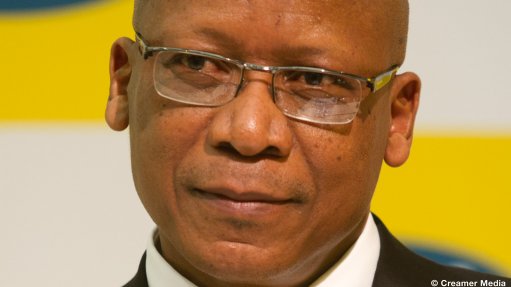
MTN Group CEO Sifiso Dabengwa
Photo by: Duane Daws
Telecommunications group MTN on Wednesday posted a double-digit decline in earnings for the six months to June 30, as its Nigeria operations faced headwinds and foreign exchange fluctuations hit revenue.
Group headline earnings a share plunged 10.3% to 654c during the six months, while earnings a share fell 10.7% to 653c.
MTN’s overall profit after tax saw an 11% contraction from R15.6-billion in the six months to June 2014, to R13.8-billion in the first half of 2015, while operating profit declined 13% to R19.9-billion in the interim period under review.
Group earnings before interest, taxes, depreciation and amortisation (Ebitda) decreased 10.1% to R30.3-billion during the first half of this year, with the Ebitda margin contracting 2.6 percentage points to 43.7% on the back of lower Ebitda margins in Nigeria, Cameroon, Côte d'Ivoire and Uganda, which were partly offset by a 5.4% hike in South Africa’s Ebitda to R6.7-billion, said MTN group CEO and president Sifiso Dabengwa.
Speaking at the group’s half-year results presentation, in Roodepoort, he noted that, while MTN’s group subscribers rose 3.4% to 231-million, a contraction in revenue in two of MTN’s largest markets, amid a 6% foreign exchange currency contraction, had dragged overall group revenue down 5% to R69.2-billion.
MTN South Africa’s performance had been hit by handset supply chain challenges and a five-week-long industrial action in the first half of the year, leading to a revenue drop of 1.4% to R18.9-billion, while Nigeria had been impacted by a challenging operating environment, with revenue contracting 1.1% to R24.6-billion.
Ebitda reported from the Nigeria operations, which continued to experience significant challenges during the period under review, had plunged 13.2% to R14.1-billion, while the Ebitda margin decreased to 57.3%.
The Nigerian operations, which posted subscriber growth of 4.9% to 62.8-million, saw a 1.1% decline in revenue amid a weak macroeconomic environment, aggressive competition and operational execution challenges.
The company’s large opco cluster, which included Ghana, Cameroon, Côte d'Ivoire, Uganda, Syria and Sudan, posted a 6.3% decline in revenue to R14.8-billion, while the Ebitda emerging from these operations reached R5.2-billion, an 8.6% contraction on the prior period.
The small opco cluster, which included Zambia, Liberia, Yemen, Benin, Guinea Bissau, South Sudan and Congo-Brazzaville, recorded a 0.8% rise in revenue to R10.9-billion and a 6.6% year-on-year contraction in Ebitda to R3.8-billion.
Meanwhile, group capital expenditure (capex) for the six months to June increased 18% to R10.9-billion, with South Africa carrying the bulk at R4.7-billion – a 133.9% rise on the R2-billion spent in the corresponding six-month period last year.
In South Africa, MTN deployed 267 new second-generation (2G) sites, 1 939 colocated third-generation (3G) sites and 1 891 long-term evolution (LTE) sites, with the South African operation’s key focus narrowing to 3G and LTE network capabilities and improved network quality.
Capex deployed to Nigeria declined by 63.2% in the first half of the year under review to R1.2-billion, as the West African operations leveraged existing capabilities. However, MTN Nigeria continued to expand its 3G coverage and increase the capacity of its current 3G network.
During the period under review, 286 new 2G sites and 744 colocated 3G sites were added.
Overall, MTN rolled out 1 335 2G, 5 048 largely colocated 3G and 2 475 LTE sites, as well as 722 km of long-distance fibre, during the six months to June.
Now as the group moved into the second half of the year, it planned to accelerate its capex plans, particularly in South Africa, to support medium-term growth, with “corrective action” implemented to mitigate the challenges experienced in its handset supply chain.
Another R4.8-billion in capex had been set aside for MTN South Africa to improve its network quality, increase capacity and expand the footprint of its 3G, LTE and fibre networks during the last half of the year.
However, capex to Nigeria had been cut back to R1.1-billion for the six months to December.
“We expect the balance of the year to remain challenging for MTN Nigeria. Notwithstanding tough operating conditions, there will be a strong focus on active subscriber management and providing more competitive voice and data offerings to high-value customers,” Dabengwa concluded.
The group declared a dividend for the period of 480c, a 7.9% rise on the prior period last year.